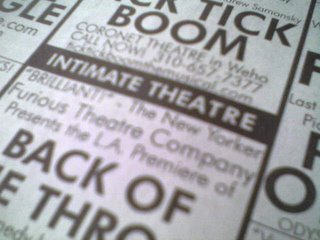I'm about to reveal big secrets about how to write a play. Prepare yourself. With this information, you could create your own work and put it up at a local theatre. I'm an expert on this since I've watched Andrew write lots of plays.
1. Get a composition notebook. Fill it with great dialogue. If you can't write sequentially because you don't have some things worked out yet, just write what you know. Make notes like "fix this" or "fill this in later" so you know what you need to do when you open the notebook again. Just write it all down and edit later. Oh, and be sure you can read your notes.
2. Get index cards and keep them handy. Sometimes you'll be hit by a flash of brilliance, sometimes your wife will say something very oddly but appropriately worded, sometimes someone in the grocery line will use the exact words you were looking for. Write these things down on the index cards. Pull these cards out later when you're sitting down with your composition notebook or your computer and figure out if you can use them.
3. Write about what you know. Research what you don't. No one wants to read or see something written by someone who is clueless and/or uninformed. For
Torrid Affaire, Andrew had to research how those lady parties work and what goods they have for sale. You never know when you're going to have an expert in your audience.
4. Listen to awesome inspirational music. This doesn't mean to pull out the Chant CD and write to that . . . Unless you're writing about monks or that's the only album that will help you through the patch of writing you're doing at the time. The music shouldn't be distracting but rather should assist you in the writing process. I like to pace my day with music generally speaking, and sometimes the mood of what I'm doing is suitable for some albums but not others.
5. Talk to yourself when you're working on the computer. You have to input the dialogue from your notebook some time, and you're going to have to edit. Type in everything you have newly written each time you sit down at the computer. Read the questionable things aloud so you can work through awkward wording and stiff lines. Keep a notepad handy so you can jot down things you work out that you're not ready to type, like "Jill can't be a lesbian because she talked about how in love with the mail
man she was at the beginning of the play" or "Joe is unusually TALL so reference it in the script." Whatever. Who cares if you sound like an idiot while you talk to yourself. You're creating art.
6. Don't go overboard with the descriptions. As the writer, you just need to write enough to communicate your idea to the director. He'll hire his own scene designer, costume designer, sound designer, lighting designer and actors. You have to leave some room for him and all of his people to contribute to the piece and make it their own. If it's key to the script that you have beanbag chairs all over the set because you set up action that can
only occur with beanbag chairs, then put beanbag chairs in your description. Describe the characters with just enough information that you know they're different people who would behave the way you wrote them. You (as the playwright) don't need to dictate that all women in the cast are above 5'7" with brown hair and all men are exactly 5'11" with tans UNLESS that's necessary for your action and storyline. A woman who is 5'6" can play the nurse if there's no line like, "Wow. You sure are an average height of 5'7" for a nurse." If you really want to write descriptions down to the stationery on the writing desk, you should be writing Victorian novels centered in the drawing room or romance novels. That's the place for that sort of thing, not the theatre.
7. Get someone you trust to read over it when you're done with the first draft. You need someone who will read it to make sure it makes sense, there aren't unintentionally contradictory character traits, spelling and punctuation are correct. This is part of what I do. I take a red pen and mark the things I don't understand, write in my questions and my editing notes. You really want to do this before you give it to anyone else to read, and you definitely want to do it before you have a table reading. Make sure it's someone you trust; don't need anyone shooting down your dreams and ragging on your art.
There you go. That's how you write a play. Now I expect all of you readers to go out there and put this information to use. I expect to hear about a rash of well-written plays popping up across the United States and beyond.





